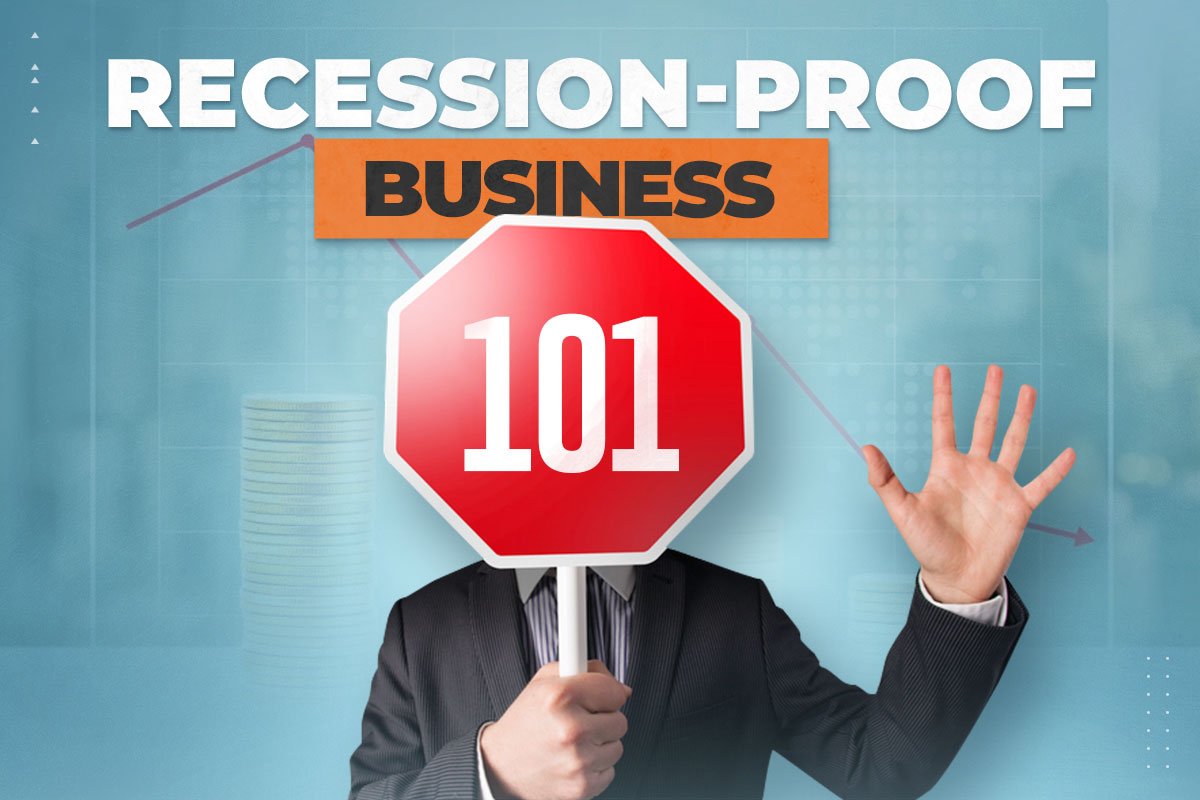The economy has been grinding along, but it won’t stay that way forever.
WARNING: This article includes some references to social, political, and economic trends. These statements aren’t meant to be opinions on your political beliefs. We simply want to recognize the role the government plays in business.
Recently, we’ve experienced high inflation, interest rates, and household debt. Meanwhile, household savings have dropped from a record high to far under the 60-year average.
Combine all that with Trump’s promise of more tariffs, which may reignite inflation, and we could be heading toward a recession soon.
Fortunately, there’s plenty you can do to create a recession-proof business and manage your personal affairs. We’re going to help you understand recessions and define recession-proof businesses.
We’ll also provide you with a list of recession-proof businesses and share insights from business owners in these high-demand fields. You can either read straight through or click on any of the links below to jump to the section that interests you:
Understanding Recessions

Knowing what a recession is will help you understand why recession-proof businesses are so beneficial. Let’s take a look at the definition of a recession and how it impacts businesses.
What is a recession?
A recession occurs when there are at least two consecutive quarters of declining growth, as measured by gross domestic product (GDP). Recessions occur when events occur that impact how much people and businesses spend.
The typical recession lasts for three quarters, or roughly 8 to 12 months of declining demand. The longest was the Great Recession at 18 months.
Unemployment rises to over 5.5% but potentially reaches as high as 10.8%. At the same time, there’s usually a 4% to 6% decline in GDP.
The nationwide shutdown in 2020 was an exception to the rule. It was only two months long, but unemployment rose to over 15%. The GDP also dropped 3.5% because of closures.
How does a recession impact businesses?
Businesses normally change their behaviors during recessions. If you own a business during a recession, you may have to:
- Pause any new projects or major investments, especially if they’re high risk
- Stop hiring or lay people off
- Lower your prices to drive demand when your customers have less to spend
- Increase your savings to support your business during the recession
While a recession is going on, many parts of the stock market will decline. Banks also become more cautious about lending. In response, the Federal Reserve normally lowers interest rates to stimulate growth.
All these factors can lead to challenges that include reduced revenue, higher expenses, and even potential bankruptcy. However, it’s important to note that not all businesses and industries are impacted the same way.
What are economic indicators of a recession approaching?
Several economic indicators that may signal an upcoming recession include:
- Drop in GDP: You can use quarterly guidance from publicly held companies and reports from the U.S. Bureau of Economic Analysis (BEA) to keep track of current trends.
- Increased unemployment: The U.S. Bureau of Labor Statistics regularly provides updates on unemployment.
- Decreased consumer spending: You can find the most recent numbers on the BEA website.
- Lower home values: Find out how the real estate market is doing through the U.S. Department of Housing and Urban Development.
- Declining stock market: Stock prices fall as investors lose confidence.
These indicators can signal that it’s time to start saving more money and hold off on investments.
What is a recession-proof business?

Recession-proof businesses are companies that are normally less impacted by recessions. They’re sometimes also referred to as “boring businesses” because they don’t have the appeal and outsized gains of tech and other innovative companies.
People often shift investments to these sectors of the economy when they’re concerned about risk. Let’s look at some recession-proof business ideas next.
Recession-Proof Business Ideas
Many recession-proof businesses share common characteristics. Look for these qualities if you need a good recession-proof business idea:
- Essential services: Offer products or services that people have to buy no matter how tight money is.
- High demand: Recession-proof businesses tend to serve the entire population, not just a small segment. Some high-end companies may be the exception.
- Adaptability: The most resilient businesses can adjust to new economic conditions. For instance, home improvement companies can also do repairs.
- Providing value: A business that provides real value to their customers is more likely to keep them than one that does the bare minimum.
Once you have an idea in mind, building a brand with a loyal customer base will make people more likely to spend their limited disposable income with you during an economic downturn.
The following suggestions are some of the best recession-proof business ideas. Consider them if you think we’re about to enter tough economic times.
Idea #1. Laundromats
Did you know that the average U.S. household does 5.7 loads of laundry a week? That doesn’t stop because of an economic downturn, which makes a laundromat a great recession-proof business idea. Laundromats also have great cash flow and profit margins.
- Average annual revenue: $330K
- Average profit margin: 22.2%
- Average startup cost: $350K
- Average time to launch: 9 months
- Projected market growth: 0.20%
- Market size: $6.6B
Want to know more about the laundromat industry? Learn how Dave Menz bought his first laundromat and now makes $1.9 million in annual revenue:
If you enjoyed this video, check out Dave’s laundromat business course with the UpFlip Academy.
Idea #2. Childcare Services
Childcare is another recession-proof business idea because many parents still have to go to work even if the economy isn’t doing well. You can run a childcare center, babysit, or offer live-in nanny services.
- Average annual revenue: $117K
- Average profit margin: 7%
- Average startup cost: $55K
- Average time to launch: 9 months
- Projected market growth: 0.10%
- Market size: $65.1B
The amount you make will depend on your business model, location, and experience, but the average parent pays $11,582, according to ChildCare Aware.
Listen to the podcast below to find out how Kristy Bickmeyer turned Twinkle Toes Nanny Agency into a $11.2 million childcare company with more than 20 locations:
Idea #3. Healthcare Services
Medical services dominate as the highest-paying jobs. Businesses in this sector provide essential services, making this one of the most recession-proof industries. With an aging population and high demand, the healthcare industry will always fare well in an economic downturn.
Idea #4. Pet-Related Services
Like healthcare, pet owners still have to feed, groom, and take their pets to the vet. Most pet-related services will do well.
Some optional services like poop scooping companies may see some downturn in clients during a recession, but given the low cost of the services, I would expect it to fare pretty well.
Find out how William Milliken started Swoop Scoop® with $174 and grew it to $2.4 million a year:
You can learn his entire strategy in the Poop Scoop Millionaire course with the UpFlip Academy.
Idea #5. Financial Advisors
Financial advisors and accountants will normally weather economic uncertainty well because they have specialized skills. Plus, people need guidance on how to protect their wealth when a recession hits.
- Average annual revenue: $446K
- Average profit margin: 13.5%
- Average startup cost: $55K
- Average time to launch: 15 months
- Projected market growth: 1.6%
- Market size: $10.6B
When you combine constant demand and strong profit margins, this recession-resistant business opportunity should do well even when the economy slows down.
Idea #6. Auto Repair Shops
Auto repair companies often see increasing demand when economic conditions worsen because it’s less risky to repair a car than to buy a new one during tough times.
- Average annual revenue: $286K
- Average profit margin: 6.3%
- Average startup cost: $150K
- Average time to launch: 11 months
- Projected market growth: 1.6%
- Market size: $81.7B
Find out how Joseph turned a mechanic shop making $30K per year into a car shop with $1 million in revenue:
Idea #7. Home Services
Home services is a catchall term for construction companies that help people maintain and remodel their homes. While home remodeling will decline when people are tight on cash, home repair and maintenance are largely recession proof. People can’t stop fixing their plumbing or the air conditioning just because of the economic climate.
Idea #8. Rental Properties

There’s a constant need for housing, and the demand doesn’t stop when the economy is stumbling. Construction isn’t keeping up with the increasing demand for homes, which means rental properties become more profitable as time goes on.
There are some years where you may run losses because a major home repair is necessary, but that will be offset over time by the increase in property values.
Idea #9. Food and Beverage Companies
A food or drink company can be a recession-proof business idea as long as the products are something people can buy at grocery or convenience stores. Restaurants and food trucks won’t fare as well during an economic downturn as the products people eat at home.
Idea #10. Grocery Stores

Grocery stores do better than other businesses during tough times. We all have to eat, and people tend to buy more food to cook at home when consumer confidence worsens.
- Average annual revenue: $13.5M
- Average profit margin: 2%
- Average startup cost: $550K
- Average time to launch: 18 months
- Projected market growth: 1.3%
- Market size: $829.9B
Grocery stores are some of the most expensive businesses to start, but they can generate huge revenues and decent profits.
Idea #11. Convenience Stores
Unless there’s another shutdown like the pandemic that causes a huge drop in driving, a gas station is a great business opportunity during almost all economic conditions.
- Average annual revenue: $14.2M
- Average profit margin: 1.8%
- Average startup cost: $875K
- Average time to launch: 18 months
- Projected market growth: 0.2%
- Market size: $140.5B
Find out more about how to open a convenience store.
Bonus Idea: Essential Services
Everything people need to go about their lives can turn into recession-proof businesses. Think about your daily routine. What products do you use every day?
- Food
- Clothing
- Shelter
- Water
- Toilet paper
- Razors
- Shampoo
- Cleaning supplies
- Electricity
- Phone
- Internet
There are plenty of other business ideas that fall into this category.
What to Do in a Recession

During a recession, you’ll want to pay more attention to market data. Most economic downturns are short enough that your business can ride it out and still make a profit over the long run. Consider these tips to help you survive a recession:
- Save money instead of spending on optional upgrades.
- Create a subscription service to increase the average revenue per client.
- Pay off debt every month so that you can use your credit during hard times.
- Look for amazing investment opportunities when markets are down. Sometimes people sign over their business just to keep from declaring bankruptcy.
- Sell any underperforming assets.
- Renegotiate payments and rent terms, if possible.
- Ask your employees to help. Dan Price almost had to lay off 20% of his company, but his employees opted for pay cuts instead. Everyone kept their jobs, and he paid them back after they weathered the storm.
- Lower profit margins, if necessary. Sometimes, lower prices will matter enough to keep customers you would otherwise lose. Remember when everywhere offered $10 pizza? Pizza places used that strategy to protect their stores from closing. Then, after the 2009 recession passed, pizza prices gradually doubled.
- Consider reducing the number of products and services you offer. Alternatively, add products and services that customers have specifically requested.
- Make sure you have business insurance that covers against business closures and loss of revenue. Apply for insurance on Simply Business.
Every business is different, but you should always be prepared for a recession. Industries tend to consolidate when smaller businesses are struggling. The smallest businesses shut down, while bigger businesses look to merge.
During the Great Recession, banks holding 6% of total deposits shut down. This created greater opportunities for the institutions that took over their assets.
At the same time, 2.4% of small businesses closed. If you have the funds, a recession can be a great time to expand.
How to Make Money During an Economic Downturn
Making money during a recession is the same as any other time. You just have to be more determined.
Assuming you have normal business profit margins, you’ll probably make a profit but barely. Fortunately, there are some things you can do to prepare to make more profits once the recession passes.
Systemize Your Business

Make the best of a slowdown. Recessions are a great time to look at how you can improve your business. Start with these:
- Automating accounting and bookkeeping
- Improving your marketing strategy
- Adding a subscription plan
- Reviewing your services to see which ones lose money
Get Rid of Underperforming Assets
Look for items you don’t use and get rid of them. Some low-hanging fruit might be:
- Work vans that are in the shop too often
- Scrap metal you never took to the recycling yard
- Equipment you bought thinking you need it, but you don’t
Run Promotions

You can run promotions to current customers if you aren’t getting enough business. You can also visit sites that help customers find skilled contractors or freelancers. It might not pay as much upfront, but it will help make money while business is slow.
Develop New Skills
There are a lot of businesses that have similar skills and tools. For instance, a pressure washing business that does driveways could also wash cars or windows. Taking on new skills will diversify your income and help you become more resilient for the next recession.
Keep Your Morale Up

During downturns, people tend to have more anxiety and depression. Sometimes, a single rough spot can destroy a person’s life. Don’t let that happen to you.
If you feel down, go for a walk, see a friend you haven’t visited recently, or get a therapist to help you think through your experiences.
Just do something to keep your mind off your struggles. Some things are beyond your control. I hope this blog has helped to give you some ideas about how to recession proof your business.
What strategies have worked best for those of you who have run a business through multiple recessions?







